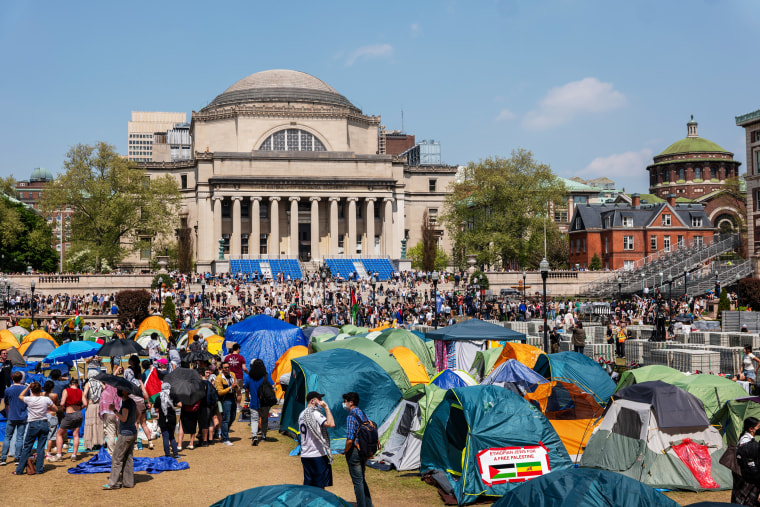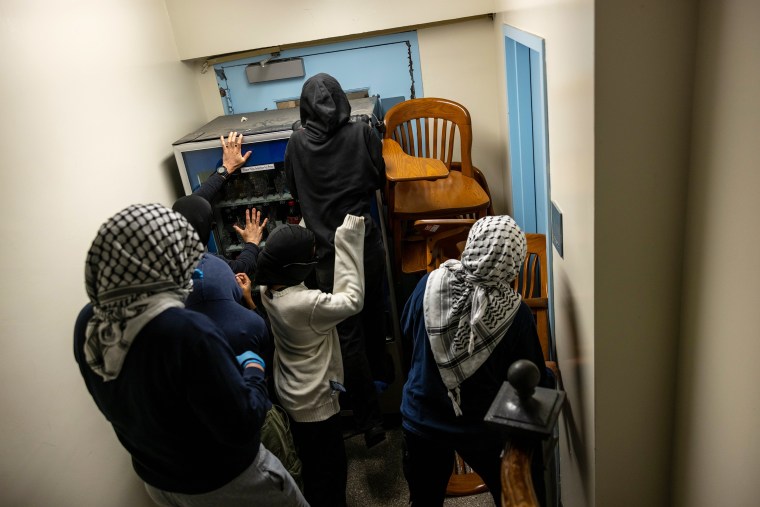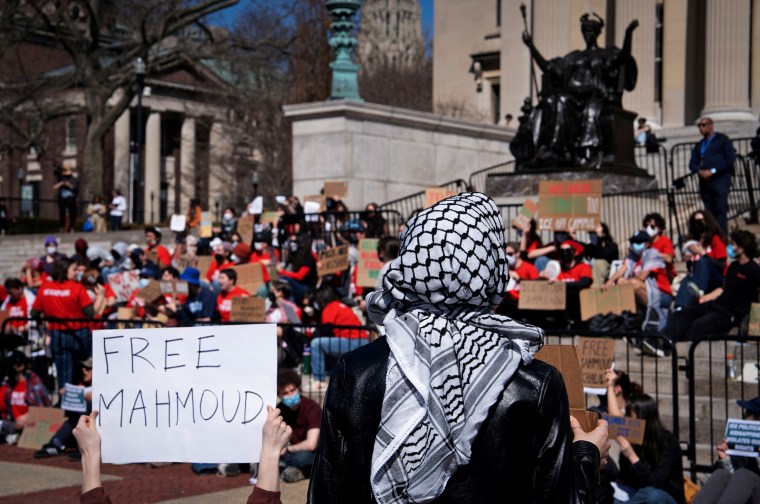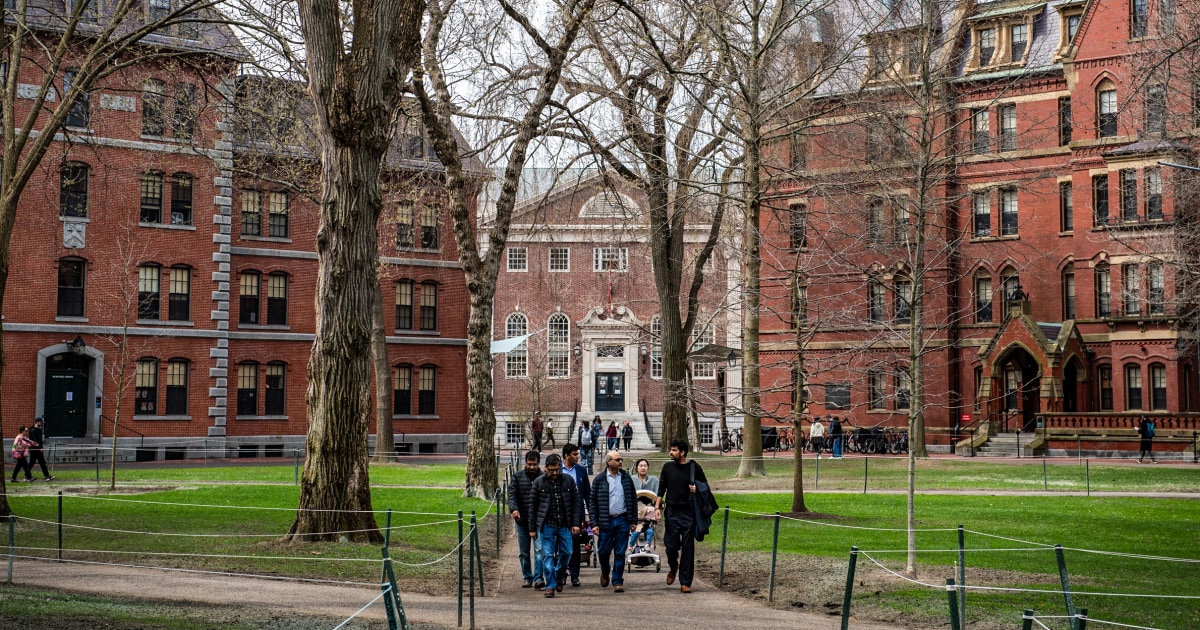Education
Columbia University agrees to Trump demands in effort to restore federal funding

Columbia University has agreed to a list of demands by the Trump administration in order to start negotiations on restoring $400 million in federal funding that was stripped from the university earlier this month, representing a striking concession by the private university to the federal government.
The Trump administration canceled the university’s federal grants on March 7, accusing the New York school of “inaction in the face of persistent harassment of Jewish students.” The abrupt cancellation of funds will end dozens, if not hundreds, of the university’s cutting edge, medical and scientific research projects.
But last week, the administration sent a letter to the university laying out nine demands that Columbia needed to accept to potentially restore funds and save the research.
In a document the university provided to the federal government and published online Friday, it appears the Trump administration got much of what it asked for.
The university has agreed to ban students from wearing masks at protests, hire 36 new campus security officers — who, unlike previous security officers, will have the ability to arrest students — and appoint a new senior vice provost to oversee the department of Middle East, South Asian and African Studies.
Columbia also committed to “greater institutional neutrality” and said it is “working with a faculty committee to establish an institution-wide policy implementing this stance.” The university added that it will review its admissions procedures to “ensure unbiased admission processes,” as the Trump administration requested.
Columbia’s interim president, Katrina Armstrong, said Friday that the school responded to the Trump administration to “ensure uninterrupted academic activities.”
“We have much to be proud of as a community, and it has been a privilege to share our progress and plans,” she said in a statement. “In the spirit of great American universities, we expect Columbians to engage in robust debate and discussion about our way forward, and we welcome it as an opportunity to shape the future of Columbia.”
The concessions by one of the nation’s oldest and most prestigious universities represent an unprecedented shift in how the federal government exerts leverage in the affairs of higher education institutions in the U.S.

On Thursday, a student-led group that organizes and leads the school’s protests, Columbia University Apartheid Divest, slammed the notion of Columbia striking a deal with the Trump administration.
“Columbia’s refusal to divest from, and even doubling down on, the genocide of the Palestinian people these past 17 months has made its expected response to the Trump Administration’s ransom note incredibly clear,” the group wrote on Instagram. “Columbia has no intention of defending its students or faculty from the government’s crackdown on Palestinian activism, instead it actively joins hands with the fascist state to sell out its community.”
On Thursday, 41 of the roughly 100 members of the university’s history department warned the university against allowing the administration to interfere in its policy. They compared the administration’s actions to attempts by “authoritarian regimes” to seek control over independent academic institutions.
“Such interventions jeopardize our ability to think honestly about the past, the present, and the future, and to do so with our students, who deserve every opportunity to learn and to think for themselves,” the history department members wrote. “Should this control be realized, here or elsewhere, it would make any real historical scholarship, teaching, and intellectual community impossible.”
The Trump administration’s demands are the latest hit for the Ivy League school, seen as the epicenter of student-led, pro-Palestinian demonstrations that eventually overtook life at college campuses across the nation.
The protests were prompted by the Israeli government’s fierce response to the Oct. 7 Hamas terrorist attacks, which has killed nearly 50,000 people living in Gaza and displaced millions. Student activists staged the demonstrations in an attempt to get their universities to divest from companies linked to the Israeli government.
For weeks last spring, Columbia students staged daily protests, established an encampment of several dozen tents on university lawns and at one point, occupied a university building. Dozens of students were arrested in the demonstrations that regularly featured controversial political slogans, including “from the river to the sea,” which some criticized as antisemitic.

Some Jewish students joined the protesters on college campuses, while others said they felt like the demonstrations were hateful. Several Jewish students also reported being assaulted at several universities.
Allie Wong, a PhD student who was arrested while protesting on campus in April of last year, said that while the protests were divisive, she believes the challenges facing Columbia unite students on a common cause.
“In terms of student response, I think that you’re actually going to have many more students involved in this, because it is no longer, you know, divestment, Israel, Palestine. It’s about all these other things,” she said, referring to democracy and freedom of speech. “And I would argue, there is no group on campus that these issues do not reach.”

The threats to federal funding followed the Justice Department’s launch in February of a task force to “root out” what it calls “anti-Semitic harassment in schools and on college campuses.”
Amid the negotiations over the grants, federal immigration officials apprehended at least two Columbia students who participated in the student-led protest, including 30-year-old Mahmoud Khalil. A doctoral student from India, Ranjani Srinivasan, also fled to Canada after her student visa was revoked.
Mohammad Hemeida, who chairs Columbia’s student governing board, said he hopes that by allowing the Trump administration to declare a victory, immigration officials will lay off students.
“The look of Columbia bowing down is not good,” he said. “But what I’m worried about mostly is students being targeted and I feel like they’ve used that as a tactic to pressure the institution.”
The arrests prompted new protests on campus and raised concerns nationwide about the federal government’s infringement on free speech.
The university’s journalism school described the apprehensions as “witnessing and experiencing an alarming chill.”
“One does not have to agree with the political opinions of any particular individual to understand that these threats cut to the core of what it means to live in a pluralistic democracy,” the journalism school said in a statement last week. “The use of deportation to suppress foreign critics runs parallel to an aggressive campaign to use libel laws in novel — even outlandish ways — to silence or intimidate the independent press.”
Columbia students are on their spring break and will return to campus next week.
Education
Judge orders detained Tufts student Rumeysa Öztürk to be transferred back to Vermont

A federal judge on Friday ordered that the Tufts University student who wrote an essay about Israel and the war in Gaza and is now fighting deportation must be transferred back to Vermont.
Judge William K. Sessions III stayed his order for four days to give the government a chance to appeal.
Rumeysa Öztürk, a 30-year-old Turkish national in the United States on a visa, is being held at an Immigration and Customs Enforcement detention center in Louisiana.
In Friday’s ruling, the judge refused efforts by the government to dismiss her habeas petition.
He found that Öztürk “has raised significant constitutional concerns with her arrest and detention.”
The Tufts doctoral student was arrested March 25 in Somerville, Massachusetts, and the Department of Homeland Security has accused her of engaging “in activities in support of Hamas.”
She co-wrote an opinion essay in 2024 for the student newspaper that called on Tufts to “acknowledge the Palestinian genocide,” which the undergraduate student government had demanded in a resolution.
The essay criticized university leadership for its response to the student government’s resolutions that it “disclose its investments and divest from companies with direct or indirect ties to Israel.”
“A university op-ed advocating for human rights and freedom for the Palestinian people should not lead to imprisonment,” one of her attorneys, Mahsa Khanbabai, said Friday. “Our immigration laws should not be manipulated to rip people away from their homes and their loved ones.”
Öztürk’s attorneys called Friday’s ruling a victory, and said that the federal government was trying to manipulate where her case would be heard so that it could try for its preferred outcome.
Friday’s ruling allows Öztürk to remain in ICE custody in Vermont while her habeas petition, which challenges her detainment, proceeds in federal court, as well as her removal case in immigration court in Louisiana.
The Department of Justice declined to comment Friday.
Öztürk is one of a number of international students in the U.S. on visas who the Trump administration is trying to deport for their actions protesting the conduct of Israel in its war against Hamas in Gaza, which it launched after the Hamas attacks on Israel on Oct. 7, 2023.
Tufts University has defended Öztürk and has petitioned that she be released from custody. The university said the opinion essay did not violate its policies and was in accordance with its position on free speech.
“The University has no further information suggesting that she has acted in a manner that would constitute a violation of the University’s understanding of the Immigration and Naturalization Act,” the university leadership said in a declaration earlier this month.
Education
Harvard’s battle with the Trump administration is creating a thorny financial situation

Harvard’s brewing conflict with the Trump administration could come at a steep cost — even for the nation’s richest university.
On April 14, Harvard University President Alan Garber announced the institution would not comply with the administration’s demands, including to “audit” Harvard’s students and faculty for “viewpoint diversity.” The federal government, in response, froze $2.2 billion in multi-year grants and $60 million in multi-year contracts with the university.
According to CNN and multiple other news outlets, the Trump administration has now asked the Internal Revenue Service to revoke Harvard’s tax-exempt status. If the IRS follows through, it would have severe consequences for the university. The many benefits of nonprofit status include tax-free income on investments and tax deductions for donors, education historian Bruce Kimball told CNBC.
Bloomberg estimated the value of Harvard’s tax benefits in excess of $465 million in 2023.
Nonprofits can lose their tax exemptions if the IRS determines they are engaging in political campaign activity or earning too much income from unrelated activities. Few universities have lost their non-profit status. One of the few examples was Christian institution Bob Jones University, which lost its tax exemption in 1983 for racially discriminatory policies.
White House spokesperson Harrison Fields told the Washington Post that the IRS started investigating Harvard before President Donald Trump suggested on Truth Social that the university should be taxed as a “political entity.” The Treasury Department did not reply to a request for comment from CNBC.
A Harvard spokesperson told CNBC that the government has “no legal basis to rescind Harvard’s tax exempt status.”
“The government has long exempted universities from taxes in order to support their educational mission,” the spokesperson wrote in a statement. “Such an unprecedented action would endanger our ability to carry out our educational mission. It would result in diminished financial aid for students, abandonment of critical medical research programs, and lost opportunities for innovation. The unlawful use of this instrument more broadly would have grave consequences for the future of higher education in America.”
The federal government has challenged Harvard on yet another front, with the Department of Homeland Security threatening to stop international students from enrolling. The Student and Exchange Visitor Program is administered by Immigration and Customs Enforcement, which falls under the DHS.
International students make up more than a quarter of Harvard’s student body. However, Harvard is less financially dependent on international students than many other U.S. universities as it already offers need-based financial aid to international students in its undergraduate program. Many other universities require international students to pay full tuition.
The Harvard spokesperson declined to comment to CNBC on whether the university would sue the administration over the federal funds or any other grounds. Lawyers Robert Hur of King & Spalding and William Burck of Quinn Emanuel are representing Harvard, stating in a letter to the federal government that its demands violate the First Amendment.
Harvard, the nation’s richest university, has more resources than other academic institutions to fund a long legal battle and weather the storm. However, its massive endowment — which has raised questions during the recent developments — is not a piggy bank.
Why Harvard’s endowment is so large
Harvard has an endowment of nearly $52 billion, averaging $2.1 million in endowed funds per student, according to a study by the National Association of College and University Business Officers, or NACUBO, and asset manager Commonfund.
That size makes it larger than than the GDP of many countries.
The endowment generated a 9.6% return last fiscal year, which ended June 30, according to the university’s latest annual report.
Founded in 1636, Harvard has had more time to accumulate assets as the nation’s oldest university. It also has robust donor base, receiving $368 million in gifts to the endowment in 2024. While the university noted that more than three-quarters of the gifts averaged $150 per donor, Harvard has a history of headline-making donations from ultra-rich alumni.
Kimball, emeritus professor of philosophy and history of education at the Ohio State University, attributes the outsized wealth of elite universities like Harvard to a willingness to invest in riskier assets.
University endowments were traditionally invested very conservatively, but in the early 1950s Harvard shifted its allocation to 60% equities and 40% bonds, taking on more risk and creating the opportunity for more upside.
“Universities that didn’t want to assume the risk fell behind,” Kimball told CNBC in March.
Other universities soon followed suit, with Yale University in the 1990s pioneering what would become the “Yale Model” of investing in alternative assets like hedge funds and natural resources. Though it proved lucrative, only universities with large endowments could afford to take on the risk and due diligence that was needed to succeed in alternative investments, according to Kimball.
According to Harvard’s annual report, the largest chunks of the endowment are allocated to private equity (39%) and hedge funds (32%). Public equities constitute another 14% while real estate and bonds/TIPs make up 5% each. The remainder is divided between cash and other real assets, including natural resources.
The university has made substantial portfolio allocation changes over the past seven years, the report notes. The Harvard Management Company has cut the endowment’s exposure to real estate and natural resources from 25% in 2018 to 6%. These cuts allowed the university to increase its private equity allocation. To limit equity exposure, the endowment has upped its hedge fund investments.
The endowment is not a piggy bank
University endowments, though occasionally staggering in size, are not slush funds. The pools are actually made up of hundreds or even thousands of smaller funds, the majority of which are restricted by donors to be dedicated to areas including professorships, scholarships or research.
Harvard has some 14,600 separate funds, 80% of which are restricted to specific purposes including financial aid and professorships. Last fiscal year, the endowment distributed $2.4 billion, 70% of which was subject to donors’ directives.
“Most of that money was put in for a specific purpose,” Scott Bok, former chairman of the University of Pennsylvania, told CNBC in March. “Universities don’t have the ability to break open the proverbial piggy bank and just grab the money in whatever way they want.”
Some of these restrictions are overplayed, according to former Northwestern University President Morton Schapiro.
“It’s true that a lot of money is restricted, but it’s restricted to things you’re going to spend on already like need-based aid, study abroad, libraries,” Bok said previously.
How Harvard is shoring up its finances
Harvard has $9.6 billion in endowed funds that are not subject to donor restrictions. The annual report notes that “while the University has no intention of doing so,” these assets “could be liquidated in the event of an unexpected disruption” under certain conditions.
Liquidating $9.6 billion in assets, nearly 20% of total endowed funds, would come at the cost of future cash flow, as the university would have less to invest.
Harvard did not respond to CNBC’s queries about increasing endowment spending. Like most universities, it aims to spend around 5% of its endowment every year. Assuming the fund generates high-single-digit investment returns, spending just 5% allows the principal to grow and keep pace with inflation.
For now, Harvard is taking a hard look at its operating budget. In mid-March, the university started taking austerity measures, including a temporary hiring pause and denying admission to graduate students waitlisted for this upcoming fall.
Harvard is also issuing $750 million in taxable bonds due September 2035. This past February, the university issued $244 million in tax-exempt bonds. A slew of universities including Princeton and Colgate are also raising debt this spring.
So far, Moody’s has not updated its top-tier AAA rating for Harvard’s bonds. However, when it comes to higher education as a whole, the ratings agency isn’t so optimistic, lowering its outlook to negative in March.
Education
Trump admin threatens to stop Harvard from enrolling foreign students

The Trump administration is continuing its battle against Harvard University — this time, canceling $2.7 million in grants and threatening to stop the enrollment of international students.
Homeland Security Secretary Kristi Noem on Wednesday announced the cancellation of two DHS grants to the school, declaring it “unfit to be entrusted with taxpayer dollars.”
Noem also said she sent a letter to Harvard demanding “detailed records” on foreign student visa holders’ “illegal and violent activities” by April 30.
If Harvard does not meet that deadline, it’ll immediately lose its Student and Exchange Visitor Program certification, she warned.
The release alleged Harvard’s foreign visa holders participated in riots and spewed antisemitic hate targeting Jewish students following the Hamas incursion against Israel on Oct. 7, 2023.
“If Harvard cannot verify it is in full compliance with its reporting requirements, the university will lose the privilege of enrolling foreign students,” a DHS news release said.
The two canceled grants were: an $800,303 grant for Implementation Science for Targeted Violence Prevention, which Noem said “branded conservatives as far-right dissidents in a shockingly skewed study,” and a $1.9 million Blue Campaign Program Evaluation and Violence Advisement grant that Noem alleged “funded Harvard’s public health propaganda.”
“Harvard bending the knee to antisemitism — driven by its spineless leadership — fuels a cesspool of extremist riots and threatens our national security,” Noem said in a statement. “With anti-American, pro-Hamas ideology poisoning its campus and classrooms, Harvard’s position as a top institution of higher learning is a distant memory. America demands more from universities entrusted with taxpayer dollars.”
It’s the latest punch by the Trump administration against the nation’s most prestigious university.
Earlier this week, the Trump administration announced that it would freeze more than $2 billion in grants to Harvard after the institution refused to accept demands that included auditing the viewpoints of its student body. Trump has also called for Harvard to lose its tax-exempt status.
On Monday, Harvard University’s lawyers sent a letter rejecting a list of demands from the Trump administration. In a statement posted online, Harvard President Alan Garber referred to the demands as “an attempt to control the Harvard community” and vowed to fight back.
A Harvard spokesperson told NBC News on Thursday that the school will “not surrender its independence or relinquish its constitutional rights,” while complying with the law.
-

 Education2 days ago
Education2 days agoHarvard’s battle with the Trump administration is creating a thorny financial situation
-

 Middle East1 day ago
Middle East1 day agoTunisian court hands opposition figures lengthy jail terms | Human Rights News
-

 Sports2 days ago
Sports2 days agoClint Dempsey speaks to CNN over his concerns over the USMNT heading into its home World Cup
-

 Europe2 days ago
Europe2 days agoTrump’s ‘lone ranger’: How Steve Witkoff became the defacto point man on America’s foreign policy challenges
-

 Conflict Zones2 days ago
Conflict Zones2 days agoIran has ‘doubts’ about US intentions ahead of nuclear talks | Politics News
-

 Conflict Zones2 days ago
Conflict Zones2 days ago‘How do I live like this?’ asks Gaza boy who lost arms in Israeli attack | Gaza News
-

 Conflict Zones2 days ago
Conflict Zones2 days agoTrump says US may ‘pass’ on helping end war if Russia, Ukraine resist deal | Russia-Ukraine war News
-

 Sports2 days ago
Sports2 days agoMax Verstappen dismisses concerns over possible Red Bull exit after turbulent start to season




